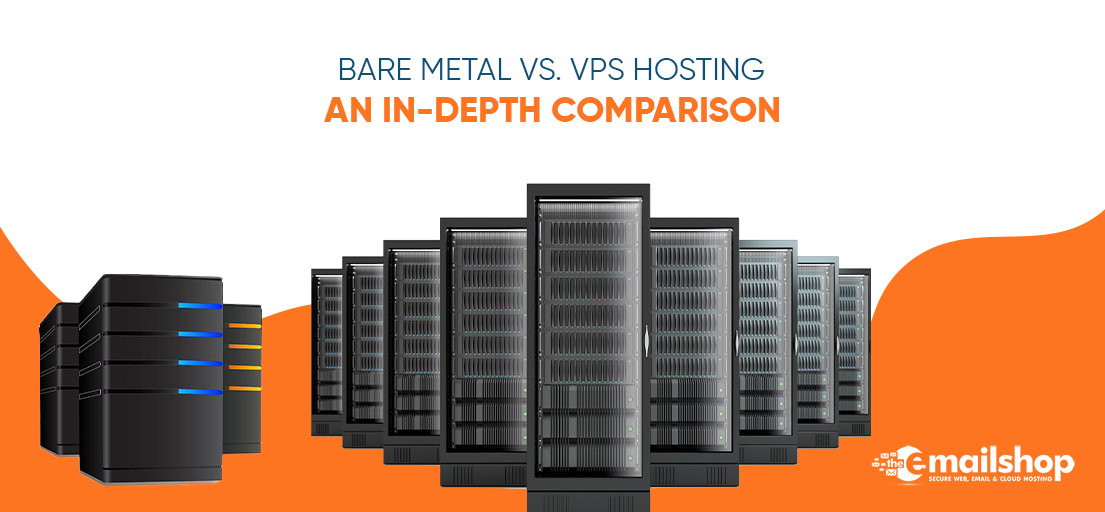There are different options available for server hosting packages. Hosting on bare metal (dedicated) servers and virtual private server (VPS) hosting are two common varieties. Nevertheless, choosing the choice that best suits your needs might be difficult because each has pros and cons of its own.
To put it simply, virtualization often offers less power, control, security, and performance consistency than a bare metal server. However, because virtualized servers are agile and dynamic, IT may quickly spin up or down new test environments or other temporary workloads. This article compares bare metal servers and virtual servers, helping you choose the best infrastructure to meet your needs.
Bare Metal
A bare metal server is essentially a physical device that houses a server. It refers to all of the physical components of the server, including the wiring, circuitry, and metal. Interestingly, all servers, virtual or otherwise, start with a type of bare-metal server.
A single-tenant physical server is called a bare-metal server in a more technical meaning. Instead of sharing the server with a group, you and nobody else will be working on it when you employ this tactic. Think about the differences between an apartment block and a single-family home to further understand this.
Advantages of Bare Metal Servers
- Performance: Bare Metal Servers, which are indispensable for applications needing a lot of computing power, offer unparalleled processing power and memory access speeds because of their dedicated resources.
- Security: The lack of a common environment makes a hosting solution far more secure by lowering vulnerability to cyber threats.
- Control and Customization: With total control over the server, users can install any program they want, choose any operating system, and configure any hardware to suit their needs. This flexibility enables extremely customized environments.
Virtual Servers
A virtual operating system that lives inside a primary server and is intended to supply and assign resources to virtual servers is called a cloud virtual private server (VPS). With comparable capabilities and operations, a virtual private server (VPS) resembles a physical server.
A VPS employs a parent server to host numerous virtual servers that are geographically separated from one another. It is typically used for lesser workloads that require continuous performance. Although the virtual servers are isolated from one another, if one of the VPS tenants is experiencing strange challenges, they might share networking resources and cause noisy neighbors.
Advantages of Virtual Private Servers
- Cost-Effectiveness: Because VPS hosting is less expensive than dedicated hosting, small to medium-sized enterprises and individual projects find it to be a desirable choice.
- Scalability: With minimal investment, resources can be readily scaled up or down in response to demand, giving flexibility to manage growth periods or surges in traffic.
- Flexibility: VPS hosting is appropriate for a variety of use cases, including web hosting and application development, because it supports a broad range of services and applications.
Bare Metal Servers vs VPS Comparison
-
Performance and Resource Allocation
Bare metal servers offer dedicated hardware resources, providing superior performance and consistency compared to VPS. With bare metal, there’s no virtualization overhead, allowing applications to utilize the entire server’s power. On the other hand, VPS shares resources among multiple virtual instances, leading to potential performance fluctuations depending on the host server’s load and other virtual machines’ activities.
-
Scalability and Flexibility
VPS platforms excel in scalability and flexibility, allowing users to easily upgrade or downgrade resources like CPU, RAM, and storage on-demand. This scalability makes VPS ideal for rapidly growing businesses or applications with fluctuating resource requirements. In contrast, bare metal servers often require manual upgrades or hardware replacements, leading to longer scaling times and potential downtime during upgrades.
-
Isolation and Security
Bare metal servers provide strong isolation since each server operates independently without sharing resources or environments with other users. This isolation enhances security and minimizes the risk of neighboring instances impacting performance. VPS, while generally secure, shares underlying hardware with other virtual instances, potentially posing security risks if the host environment is compromised.
-
Cost Considerations
Bare metal servers are typically more expensive upfront due to the dedicated hardware cost. However, they can offer cost savings in the long run for resource-intensive applications or businesses with steady resource needs. VPS, on the other hand, often involves lower initial costs due to shared resources but can become more expensive as resource usage scales up.
-
Management and Control
Bare metal servers can be customized physically and offer complete control over hardware configurations, which makes them ideal for certain hardware needs or performance enhancements. On the other hand, VPS providers handle virtualization, hardware maintenance, and upgrades, which minimizes user administrative burden. This makes VPS management simpler and more efficient.
-
Use Cases and Application Suitability
Large-scale databases, high-performance computation, and applications needing stringent security and resource isolation are better served by bare metal servers. On the other hand, virtual private servers (VPS) are perfect for small and medium-sized businesses, web hosting, development environments, and applications with varying resource requirements due to their affordability and scalability. Many factors influence the choice between bare metal and virtual private servers (VPS), including cost, scalability, security requirements, and performance demands.
-
Disaster Recovery and High Availability
Bare metal servers often require additional setup and configuration for disaster recovery and high-availability solutions, such as clustering or replication across multiple physical servers. This guarantees less downtime and data loss in the event of emergencies or hardware malfunctions. However, by offering automated backups, failover options, and integrated high availability, VPS providers typically make users’ disaster recovery planning easier.
-
Environmental Impact and Sustainability
Bare metal servers consume more power and physical resources compared to virtualized environments like VPS. This higher resource usage contributes to a larger carbon footprint and environmental impact. In contrast, VPS utilizes resources more efficiently by sharing physical hardware among multiple virtual instances, leading to reduced energy consumption and lower environmental footprint, making it a more sustainable option in many cases.
Read More: Why It’s Smarter to Host Your Emails and Website Separately
Email Shop Delivers Bare Metal and VPS Hosting Solutions!
If you’re thinking about using bare metal or VPS hosting, Email Shop can assist. We collaborate with a network of worldwide hosting providers to offer personalized solutions that fit your requirements and budget. We also provide cloud, colocation, connectivity, unified communications, value-added resale, and advisory services. This means that we can be your partner for all your technology needs. Email Shop is dedicated to being your most reliable and responsive IT partner. Don’t wait any longer; start today!
For Discount and Offers, Visit our Official Twitter Page









